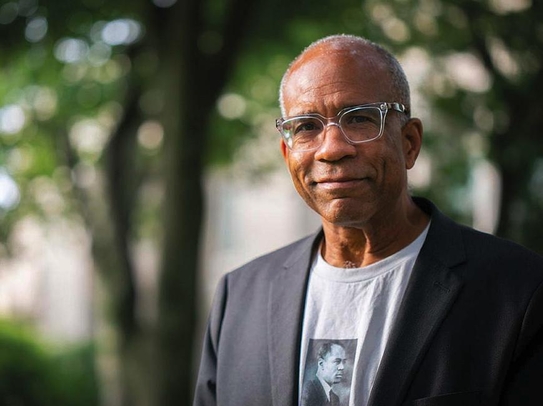 Compulsory diversity pledges and what they represent "make me wince," says Harvard law professor Randall Kennedy. (Photo: Stephanie Mitchell/Harvard University) |
"I AM A scholar on the left committed to struggles for social justice," says Randall Kennedy, a prominent Harvard Law School professor whose teaching and writing has focused on civil rights, race relations, and the intersection of racial conflict and the law. Kennedy, who once clerked for Supreme Court Justice Thurgood Marshall, has written numerous books on various aspects of race in American life, including a history of the N-word. He is a Black man who was born in the Jim Crow South and grew up in a household where, in his words, "tales of racial oppression and racial resistance were staples of conversation."
But Kennedy's longtime interest in undoing wrongful discrimination and prejudice based on race has not made him a supporter of the diversity/equity/inclusion, or DEI, ideology that has entrenched itself in higher education and much of corporate America. Far from it. Writing in The Harvard Crimson last week, this storied scholar of race and justice denounced mandatory DEI statements as coercive ideological loyalty oaths that ought to have no place in higher education.
At many colleges, including Harvard, applicants for teaching positions must include a so-called diversity statement setting forth their commitment to DEI and how they intend to promote it in their work. But requiring prospective instructors to pledge their dedication to a specific ideology — let alone one as tendentious, controversial, and politicized as the DEI worldview — is an egregious assault on academic freedom, free speech, and the right to hold heterodox views on issues of public concern.
In a story last year on how diversity statements had become de rigueur on many campuses, The Economist described the approach at the University of California, Berkeley, where search committees were given formal guidance on how to evaluate diversity statements submitted by job candidates. The instructions "say that any candidate who does not discuss gender or race must be awarded low marks," The Economist reported. Low marks are also to be given to any "earnest classical liberal" who expresses an intention to ignore students' racial, sexual, ethnic, and other demographic backgrounds and to "treat everyone the same."
Such demands for conformity — kiss the DEI ring or forget about getting a job here — appall Kennedy. "Candidates for academic positions at Harvard should not be asked to support ideological commitments," he wrote in his Crimson essay. "Imagine the howl of protest ... if a school at Harvard asked a candidate for a faculty position to submit a statement of their orientation towards capitalism, or patriotism, or Making America Great Again with a clear expectation of allegiance."
Kennedy's aversion echoes that of another prominent Harvard scholar. Steven Pinker, a professor of psychology and a noted public intellectual, decried mandatory diversity statements in a Globe op-ed last December. By requiring applicants to genuflect to a particular way of thinking about race, identity, and victimhood, diversity statements "purge the next generation of scholars of anyone who isn't a woke ideologue or a skilled liar."
DEI policies on campus and the infrastructure created to perpetuate them — including mandatory diversity statements — fly under a false flag. Instead of diversity, they promote a rigid ideological uniformity. Instead of equity, they advocate inequity in the treatment of political minorities. And far from being inclusive, they support the exclusion of opinions disfavored by the left. Besides, there is a strong case to be made that they amount to enforced speech and viewpoint discrimination under the First Amendment and are therefore unconstitutional, at least at public universities.
In some corners of academia, the tide has begun to turn. At the University of North Carolina, Texas A&M University, Ohio State University, and all 26 public colleges and universities in Georgia, mandatory diversity statements have recently been uprooted. But at Harvard and other bastions of progressive orthodoxy, there is still work to be done.
"It would be hard to overstate the degree to which many academics at Harvard and beyond feel intense and growing resentment against the DEI enterprise," declared Kennedy. Compulsory diversity statements and what they represent, he wrote, "make me wince. The practice of demanding them ought to be abandoned."
Jeff Jacoby is a columnist for The Boston Globe. This column is adapted from the current issue of Arguable, his weekly newsletter.
-- ## --
Follow Jeff Jacoby on X (aka Twitter).
Discuss his columns on Facebook.
Want to read more? Sign up for "Arguable," Jeff Jacoby's free weekly email newsletter.

